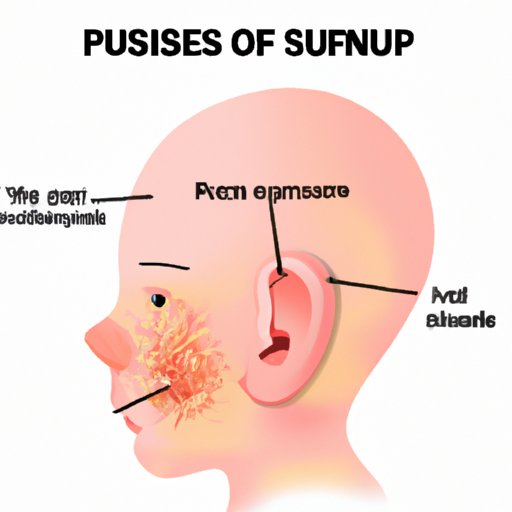I. Introduction
Have you ever experienced a sensation of your ears popping when you blow your nose? This common problem can be uncomfortable and cause a feeling of pressure in your ears. In this article, we will explore the science behind why your ears pop when you blow your nose, why it’s more common during a cold or high altitude travel, and home remedies to alleviate the discomfort.
II. The Science behind Ears Popping When You Blow Your Nose
To understand why your ears pop when you blow your nose, it’s important to understand the anatomy of your ear, nose, and throat. The Eustachian tube connects the middle ear to the back of your nose and throat. When you blow your nose, it changes the pressure in your nose and throat, which can affect the pressure in your middle ear. This change in pressure causes the Eustachian tube to open, allowing air to flow in or out of the middle ear, which causes the sensation of ear popping.
III. Why Your Ears Pop During a Cold and How to Alleviate the Discomfort
During a cold or allergies, the Eustachian tube can become blocked with mucus, making it harder to regulate the pressure in your ears. This blockage can lead to discomfort, hearing problems, and ear popping. To alleviate the discomfort associated with ear popping, you can try nasal decongestants, nasal corticosteroids, or over-the-counter pain relievers. Saline nasal sprays or neti pots can also help to loosen mucus and relieve congestion, which can alleviate ear popping.
IV. Understanding Eustachian Tube Dysfunction and Its Connection to Ear Popping
Eustachian tube dysfunction occurs when the Eustachian tube fails to open or close properly, leading to the sensation of ear popping. This dysfunction can be caused by allergies, sinus infections, or even changes in altitude. For some, it is a chronic problem and may require medical intervention. Treating underlying conditions that lead to Eustachian tube dysfunction, such as an ear infection or sinus problems, can help alleviate ear popping and other associated symptoms.
V. Why is Ear Popping So Common When You Fly or ASCEND at High Altitudes?
Changes in atmospheric pressure can cause your ears to pop, which is why it’s common during high altitude travel. As you ascend to higher altitudes, the air pressure decreases, which can cause a difference in pressure between the middle ear and the outside environment. This difference in pressure can cause the Eustachian tube to open, leading to ear popping. To alleviate this discomfort, you can try chewing gum, swallowing, or using special earplugs designed for high altitude travel.
VI. Home Remedies to Get Rid of Ear Popping: Try These Simple Tricks
There are several home remedies that you can try to alleviate ear popping and associated discomfort. These include yawning, swallowing, or chewing gum to help regulate the pressure in your Eustachian tube. Applying a warm compress to your ear can also help to alleviate discomfort. Over-the-counter ear drops or hydrogen peroxide may also be helpful in clearing out excess wax or debris that can contribute to ear popping. However, it is important to note that home remedies may not be effective for everyone and it’s important to seek medical attention if your symptoms persist.
VII. The Link Between Sinus Pressure and Ear Popping – What You Need to Know
Sinus pressure can contribute to the sensation of ear popping, as the Eustachian tube is connected to the sinuses. When the sinuses become congested or inflamed, it can affect the pressure in the Eustachian tube, leading to ear popping and discomfort. To alleviate sinus pressure, you can try using a neti pot to flush out your sinuses, applying a warm compress to your face, or taking over-the-counter pain relievers. If your symptoms persist or worsen, it’s important to seek medical attention to rule out any underlying conditions such as an infection or allergy.
VIII. Conclusion
In conclusion, ear popping is a common yet uncomfortable condition that can be caused by changes in pressure in the ear, nose, and throat. While home remedies can help alleviate discomfort, it’s important to seek medical attention if your symptoms persist or worsen. By understanding the science behind ear popping, you can take steps to prevent it during high altitude travel and treat underlying conditions that contribute to Eustachian tube dysfunction.
Remember to always take care of your ears, and seek medical advice if your symptoms persist beyond the recommended treatment period.
